Reflexive verbs - Study guides, Class notes & Summaries
Looking for the best study guides, study notes and summaries about Reflexive verbs? On this page you'll find 86 study documents about Reflexive verbs.
Page 4 out of 86 results
Sort by
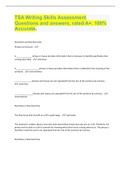
-
TSA Writing Skills Assessment Questions and answers, rated A+. 100% Accurate.
- Exam (elaborations) • 13 pages • 2023
-
Available in package deal
-
- $8.49
- + learn more
TSA Writing Skills Assessment Questions and answers, rated A+. 100% Accurate. Restrictive and Nonrestrictive Phrases and Clauses - - A ______________ phrase or clause provides information that is necessary to identify specifically what is being described. - -restrictive A ____________________ phrase or clause provides information that is incidental to the meaning of the sentence. - -nonrestrictive _______________ phrases and clauses are not separated from the rest of the sentence ...
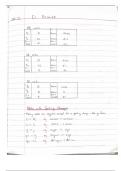
-
Spanish Grammar- Verbs- The Indicative
- Summary • 20 pages • 2024
-
- $7.94
- + learn more
This document is a set of comprehensive notes for the indicative mood in Spanish. I received an A* in my Spanish exams using these notes. The notes are colour coded and have examples in English and Spanish, with helpful tables. These notes cover: The Present Tense The Preterite Tense The Reflexive Tense The Imperfect Tense The Future Tense The Conditional Tense The Perfect Tense The Pluperfect Tense The Future Perfect Tense The Conditional Perfect Tense The Present Continuous Tense ...

-
Reflexives in Frencg
- Class notes • 2 pages • 2024
-
- $12.49
- + learn more
What are reflexive verbs & pronouns? Reflexive verbs are pronominal verbs–ones that use a reflexive pronoun. The verbs that use reflexive pronouns indicate that the subject of the verb is doing something to itself. If the subject does the...
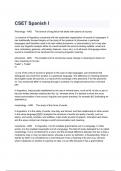
-
CSET Spanish I Questions With Correct Answers VeItfied By Experts
- Exam (elaborations) • 23 pages • 2024
-
- $7.99
- + learn more
CSET Spanish I Que CSET Spanish I Phonology - ANS The branch of linguistics that deals with sytems of sounds. is a branch of linguistics concerned with the systematic organization of sounds in languages. It has traditionally focused largely on the study of the systems of phonemes in particular languages (and therefore used to be also called phonemics, or phonematics), but it may also cover any linguistic analysis either at a level beneath the word (including syllable, onset and ri...
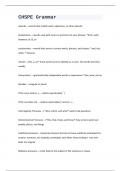
-
CHSPE Grammar 2023/2024
- Exam (elaborations) • 5 pages • 2023
-
- $7.99
- + learn more
adverbs -->words that modify verbs, adjectives, or other adverbs prepositions -->words used with nouns or pronouns to your phrases. *from, with, between, of, &, to conjunctions -->words that serve to correct words, phrases, and clauses. *and, but, when, * because articles -->the, a, an* these words serve to identify as a noun. The words that they modify interjections -->grammatically independent words or expressions *alas, wow, oh my Number -->singular or plural If the n...
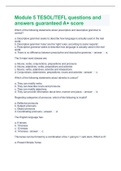
-
Module 5 TESOL/TEFL questions and answers guaranteed A+ score
- Exam (elaborations) • 3 pages • 2023
-
Available in package deal
-
- $18.49
- + learn more
Module 5 TESOL/TEFL questions and answers guaranteed A+ score Which of the following statements about prescriptive and descriptive grammar is correct? a. Descriptive grammar seeks to describe how language is actually used in the real world. b. Descriptive grammar 'rules' are the 'right' rules, according to some 'experts'. c. Prescriptive grammar seeks to describe how language is actually used in the real world. d. There is no difference between prescriptive and descriptive grammar. ...
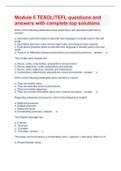
-
Module 5 TESOL/TEFL questions and answers with complete top solutions
- Exam (elaborations) • 3 pages • 2023
-
- $8.99
- + learn more
Module 5 TESOL/TEFL questions and answers with complete top solutions Which of the following statements about prescriptive and descriptive grammar is correct? a. Descriptive grammar seeks to describe how language is actually used in the real world. b. Descriptive grammar 'rules' are the 'right' rules, according to some 'experts'. c. Prescriptive grammar seeks to describe how language is actually used in the real world. d. There is no difference between prescriptive and descriptive g...
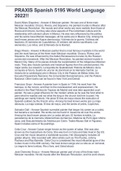
-
PRAXIS Spanish 5195 World Language 2022!!
- Exam (elaborations) • 33 pages • 2022
-
- $20.99
- + learn more
David Alfaro Siqueiros A Mexican painter. He was one of three main Mexican muralists: Orozco, Rivera, and Siquieros. He painted murals in Mexico after the Mexican Revolution. His murals and other works are more realistic than those of Rivera and Orozco, but they also show aspects of Pre-Colombian culture and its relationship with colonial culture in Mexico. He was very influenced by the politics and his works have Marxist messages. all his works are in Mexico City. Among his best known pieces a...
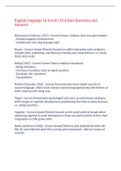
-
English Language (A-Level) | CLA Quiz Questions and Answers,100% CORRECT
- Exam (elaborations) • 4 pages • 2023
-
Available in package deal
-
- $7.99
- + learn more
English Language (A-Level) | CLA Quiz Questions and Answers Behaviourism (Skinner, 1957) - Correct Answer- Children learn through imitation - Positive/negative reinforcement - Conditioned into using language right Bruner - Correct AnswerTheorist focused on child's interaction with caregivers. Includes LASS, scaffolding, and discovery learning and constructivism, i.e. rituals (bath, bed, meal). Bellugi (1967) - Correct AnswerTheory relating to questions: - Rising intonation - Inve...
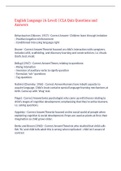
-
English Language (A-Level) | CLA Quiz Questions and Answers,100% CORRECT
- Exam (elaborations) • 4 pages • 2023
-
- $7.99
- + learn more
English Language (A-Level) | CLA Quiz Questions and Answers Behaviourism (Skinner, 1957) - Correct Answer- Children learn through imitation - Positive/negative reinforcement - Conditioned into using language right Bruner - Correct AnswerTheorist focused on child's interaction with caregivers. Includes LASS, scaffolding, and discovery learning and constructivism, i.e. rituals (bath, bed, meal). Bellugi (1967) - Correct AnswerTheory relating to questions: - Rising intonation - Inve...

How did he do that? By selling his study resources on Stuvia. Try it yourself! Discover all about earning on Stuvia


